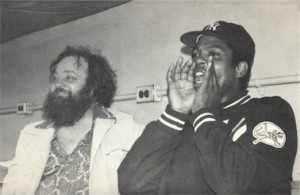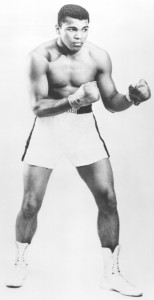On June 12, 2010 the German newspaper Frankfurter Rundschau managed to find space for an article about the legacy of Dock Ellis among the burgeoning press coverage of the 2010 World Cup. We are now able to provide a professional English translation from the original German with the help of Ursula C. Sturm who graciously offered her services at the bequest of a friend, Markus Wittek.
The original article can be found here.
The Muhammad Ali of Baseball
A game on LSD brought Dock Ellis the fame he deserved – for totally different reasons
By Wolfgang Hettfleisch
(Translation: Ursula C. Sturm, www.translations-that-click.de)
It was an unfortunate twist of events for Dock Ellis. The pitcher for the Pittsburgh Pirates, an MLB team, had used a break in the series versus the San Diego Padres to visit friends in Los Angeles. Enough time, he thought, to have a couple of drinks and joints and then consume some LSD and get high. Unfortunately, the Pirates pitcher sort of lost a day due to his LSD-induced stupor and was still on his trip, when his friends opened the newspaper and found out that he was supposed to play in a couple of hours. The effect of LSD, the most popular drug of the Hippie movement, can last for hours and hours. Ellis had no chance of coming down in time for the game.
The rest of that day 40 years ago was only a vague memory for him. Before the game started, he took some stimulants. Amphetamines were consumed like M&M’s in MLB at that time. Ellis could barely make out the opposing hitter. He only saw the fingers of his catcher, taped with fluorescent tape. The size of the baseball seemed to be as big as a pumpkin one minute and tiny like a golf ball the next. The score never registered with him. The result was a so-called no-hitter, a game where not a single valid hit is achieved by the opposing team. Things cannot get much better than that.
June 12th 1970 did not earn Dock Ellis a place in the Baseball Hall of Fame, but it did make him famous throughout the USA, even though that came much later. The writer and later poet laureate Donald Hall wrote a biography about Dock Ellis, the “different kind of baseball star”, as early as 1976. Before the book came out as a paperback in 1989, the original version, which stated that Ellis had been drunk that day in San Diego, was changed to what actually happened. Ever since, Dock Ellis, who died one and a half years ago, and his no-hitter on LSD have become baseball folklore in America.

- Donald Hall & Dock Ellis (1976)
Poets and bands have taken up the topic, and countless differing and thoroughly embellished accounts circulate on the internet. But these can easily put people on the wrong track, says Jeffrey Radice from Austin, Texas, who is planning to shoot a documentary on Dock Phillip Ellis Junior. Said documentary presents Ellis as a clever, courageous and, most of all, honest man who fought against the baseball establishment, thus becoming a forerunner for a new, proud generation of popular African-American sports stars in the USA.
Dock Ellis constituted what was later called an “Enfant terrible”. Donald Hall called him the Muhammad Ali of Baseball. The man who stated about himself that he never played a single Major League game without being high, was a child of his times. He loved Jimi Hendrix and eccentric outfits. Once he even came to training with curlers in his hair because someone had complained about his hairstyle. And when spectators insulted him with racist comments, he would sometimes climb into the stands to kindly inquire what the problem was and whether it could possibly be solved over a shared dinner.
“He wasn’t perfect, he may not have been particularly noble, but he was human”, says Jeff Radice. This was enough to make the headstrong jock an outsider in professional baseball in the 1970s. Plus he was African-American. The Major Leagues had only been opened for African-American players in the 1940s, when racial segregation in US baseball was abolished and the Negro Leagues, where African-Americans played amongst themselves, were dissolved.
Ellis, who saw himself in the tradition of the civil-rights movement, became an icon for a new, self-confident generation of African-American athletes. Many ambitious African-American athletes decided to play baseball. This trend has long since changed. Today, Latino players dominate the MLB, while most African-American talents decide to play basketball or American football. With his film project “Dockumentary”, Jeff Radice therefore wants to examine a chapter in US sports history which is increasingly falling into oblivion. He quotes Jacques Barzun, a French-American cultural historian, who stated, “To understand America you must first understand baseball.”
Dock Ellis continues to be misunderstood. After his short and sensational career, which brought him a championship with the Pittsburg Pirates and a start in the All-Star Game, he retired in the late 1970s. After that, baseball no longer played a role in his life. He managed to overcome his addictions, became a drug counselor, and spoke openly about a fact that nobody in MLB wanted to hear: that the majority of the players of his time were on something – pretty much anything that would enhance their performance. The steroid scandal involving stars like Mark McGwire and Barry Bonds indicates that the preferred substances may have changed, but the principle has not. Dock Ellis, the flamboyant Ali of Baseball, died in December 2008 at the age of 63 as a result of a cirrhosis of the liver.

- Muhammad Ali of Boxing
[…] This post was Twitted by radicimo […]
I have an autograph from Dock Ellis from 1970. I had the baseball card but someone stole it. I still managed to hold on to the autograph.